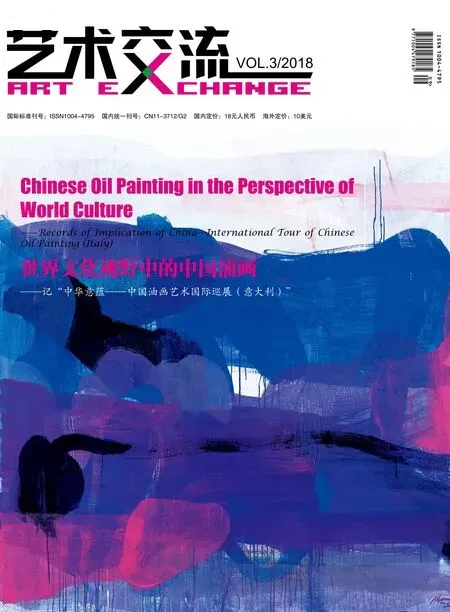与通海古城的对话
2018-04-12杜俊平
文、图杜俊平
我来到水韵山秀、人文荟萃、有着“礼乐名邦”之美誉的云南省通海古城,短短二日,让我从冠冕南州的秀山文庙,了解到通海古城至今已有630多年历史;让我从保存完好的24条古街古巷,穿梭到明清的时光隧道;让我从设计独特的民宅建筑,品味到200多所“一颗印”式明清古民居的历史沧桑;让我从承载梦想的茶马古道上,寻找到昔日马帮行走的痕迹;让我从勤劳淳厚的街坊邻居,领悟到他们对未来美好生活的希望;让我从传统的冠笄之礼,接受到古老中华文化的洗礼。这就是位于云南省玉溪市的通海古城,一个古老、遥远、神秘,而又富含新气象的通海古城。
渊源的礼乐名邦
通海古城是一座有着悠久历史的文化古城,自古以来,社会民风淳朴,文化底蕴深厚,八方商贾云集。当你站在秀山文庙外,你会感觉到文庙红墙上那“礼乐名邦”四字格外醒目,其释意:“礼,管理好国家,达到社会和谐,生活安定;乐,移风易俗,消除邪念,助长高尚情操;名邦,意为人才备出的地方,仅明清两代通海考取举人、进士等共278人,仅清朝时期,在通海庙学中曾经培养出朱嶟(礼部尚书),公孙翰林的董玘、董健,著名书法家阚祯兆等”。
在游览古民居中,我还发现了一个很有意义的多元民间文化现象,由于通海古城是蒙古族、彝族、哈尼族等少数民族居住地,每家每户厅堂中,都选挂了富有屋主个性、表现内容不一、民族特色鲜明的壁画、对联和诗赋;庭院内造型各异的水榭、长廊和壁画,充分彰显了通海少数民族的中华文化底蕴。时至今日,引以为赞的是古城百姓依然保持吟诗作画的传统,时不时地在秀山文庙里,或自家院中,“把酒当歌对对子,挥毫泼墨弄诗画,虽言世外无桃源,安享儒雅慢生活”。
独特的民宅建筑
从明洪武十五年(1382年)土城建成,整座古城依山(秀山)面湖(杞麓湖)而建,坐南朝北,城池中规中矩,东西南北街道交会中心处——聚奎阁,从空中俯瞰,通海古城犹如一颗印,这聚奎阁就是印把,而古民居围绕聚奎阁四射而建。正如清代诗人钱南园所赋“孤城临水背依山,忆在江南烟雨间”。
举目而望,青石板路两旁的古宅、商铺、寺院,皆保留明清风格,民居建筑形式多样,院落组合,古宅门头古香古色,都遵循了滇中“一颗印”四合院格局,经过数百年的历史演变,依然保留其古雅韵味,尤其是古民居中的亭台水榭长廊、庭院枋柱花桩、盆景木雕壁画、古琴石池碑林,在能工巧匠的手下得以完美结合。正是这一座座民宅,在风吹雨打中屹立着,在袅袅炊烟中生存着,在传承文化中倾诉着,向人们述说着一个又一个古老的故事,成为古城百姓生活中最引以自豪的浪漫。
古老的古街古巷
通海古城街巷,围绕聚奎阁,由东西南北大街向外延伸,体现了中国传统的“九宫格局”模式。全城共有传统街巷24条,其中南北走向街巷12条,东西走向街巷12条,至今仍保留原有的格局和街巷名称,它就像通海古城的经脉,静静地连接着你我他,演绎着一个又一个美丽的传说。
当你顺街而行,穿巷而过,只见街巷井然有序,民舍保存完好,百姓文明和谐,在这安逸从容的日子里,走在青石板铺就的街巷上,无论你遇到什么人、走进哪一家,打探什么故事,他们都温和笃定、彬彬有礼的热情地招呼,进屋让座,端茶上烟,唠嗑不止。似乎这里的每一处宅院、每一块石板、每一口古井都在默默地述说着通海传统文化的悠悠岁月。
寂静的茶马古道
通海曾是茶马古道上的一个重要驿站,我打听到永济桥是当年茶马古道的必经之路,顺着斑驳陆离的街巷,来到了永济桥,这里已无昔日的车水马龙,如今是那样寂静安详,可谓“只闻知了叫,不见马儿鸣”。虽然,茶马古道上的那座有名的永济桥下的河流已干涸,永济桥旁曾商贾云集的马店已改作它用,但是,永济桥仍坚守着这条承载过无数赶马人梦想的黄金古道,走在被昔日马蹄磨得锃亮的石块上,你还会发现当年马帮走过留下深浅不一的马蹄印,记录着古老岁月的痕迹。
据通海县志记载,唐朝初期,唐王朝的统治力量从“安南(越南河内)”经过“通海”,到达“拓东城”(今昆明)和“大理”,从而紧紧地控制了云南,巩固了云南的统一。通海地处滇中,距离昆明125公里,距玉溪40多公里,东南亚国际大通道——泛亚铁路从通海境内通过,是一条物产富饶、人文荟萃的黄金古道,更是南下交趾(今越南),北入滇中,再入巴蜀,西与滇西、缅甸、印度相连的交通枢纽之地。 但是,1910年滇越铁路开通之后,通海古城逐渐失去了交通优势,致使通海古城慢慢地沉寂在深闺中……
淳朴的街坊邻居
走在青石板铺就的街巷中,似乎触摸到明清时光,饱经风霜的傣族老太、休闲娱乐的蒙族阿爸、哈尼妇女及挥毫作画的彝族青年,这一切构成了仁义孝悌、和谐安详、天人合一的通海古城生活画卷。
在一家民宿客栈里,我与客栈的老人家和她儿媳聊起来,她家是镇上第一批改建民宿客栈的,院内建设古香古色,双人标间舒适洁净、袅袅梵香入静入心。老人家已九十高寿,耳不聋、眼不花,拉着我指着大门口的客栈牌子说,这是政府发的“优秀客栈”牌子。看着老人家脸上瞬间洋溢出的满足、自豪和幸福感,我也由衷地替老人家老有所依、老有所养、老有所乐而感到欣慰,这就是中华传统——忠孝美德,我祝福老人家福如东海,寿比南山。
传统的冠笄之礼
成人礼也称冠笄之礼,儒家将冠礼定位于“礼仪之始”,具有极高的文化地位,15岁至18岁的少年参加成人礼。在冠笄之礼中启发青年人爱国、进步、理性、奋进等应有的精神品格,旨在以庄重的仪式开启人生的新篇章,承担责任,履行义务,宣告自己已成人。在这个特别温馨的成人礼日子里,父母给孩子加戴冠笄,并亲手给孩子梳头,男孩家长给儿子戴冠冕,女孩家长给女儿行加笄,寓意着孩子,不再娇惯任性,告别幼稚,走向成熟,担当起社会责任,也标志着孩子们的人生由此扬帆启航。
通海古城一直沿续着冠笄之礼这种活动,每年不定期地举行,让父母和孩子同时接受中华民族传统文化的熏陶浸润,为父母与孩子架起心灵桥梁,让孩子行孝道、知礼仪、懂感恩,让父母对孩子多理解、多沟通,从而融洽相处。虽然,我没有直接参与冠笄之礼活动,但是,在通海秀山小学的画廊里,我还是感受到了冠笄之礼的传统魅力所在。
虽然,这只是通海古城传统文化的一隅,但是,你仔细品味会感觉到,千年时光也许就在不经意中从秀山和文庙间缓缓流过,不仅融汇在杞麓湖的涟漪里,而且也融进了我们每个人的心中……
我伫立在文庙孔圣人与众弟子雕像前,感觉到天地间是那样的寂静,一种从未有过的悠闲慢生活场景映入眼帘,一朵白云悬吊在文庙上空慢慢地飘浮,虔诚的香客在慢慢地上香、跪拜和祈祷,而我也在慢慢地品味这从未有过的古城对话。无论怎么说,通海古城曾是茶马古道上的一个重要驿站,其保存完整的空间格局、街巷肌理和建筑风貌,不仅透着昔日的繁荣昌盛,而且更是传承和弘扬我中华之礼乐名邦的地方。
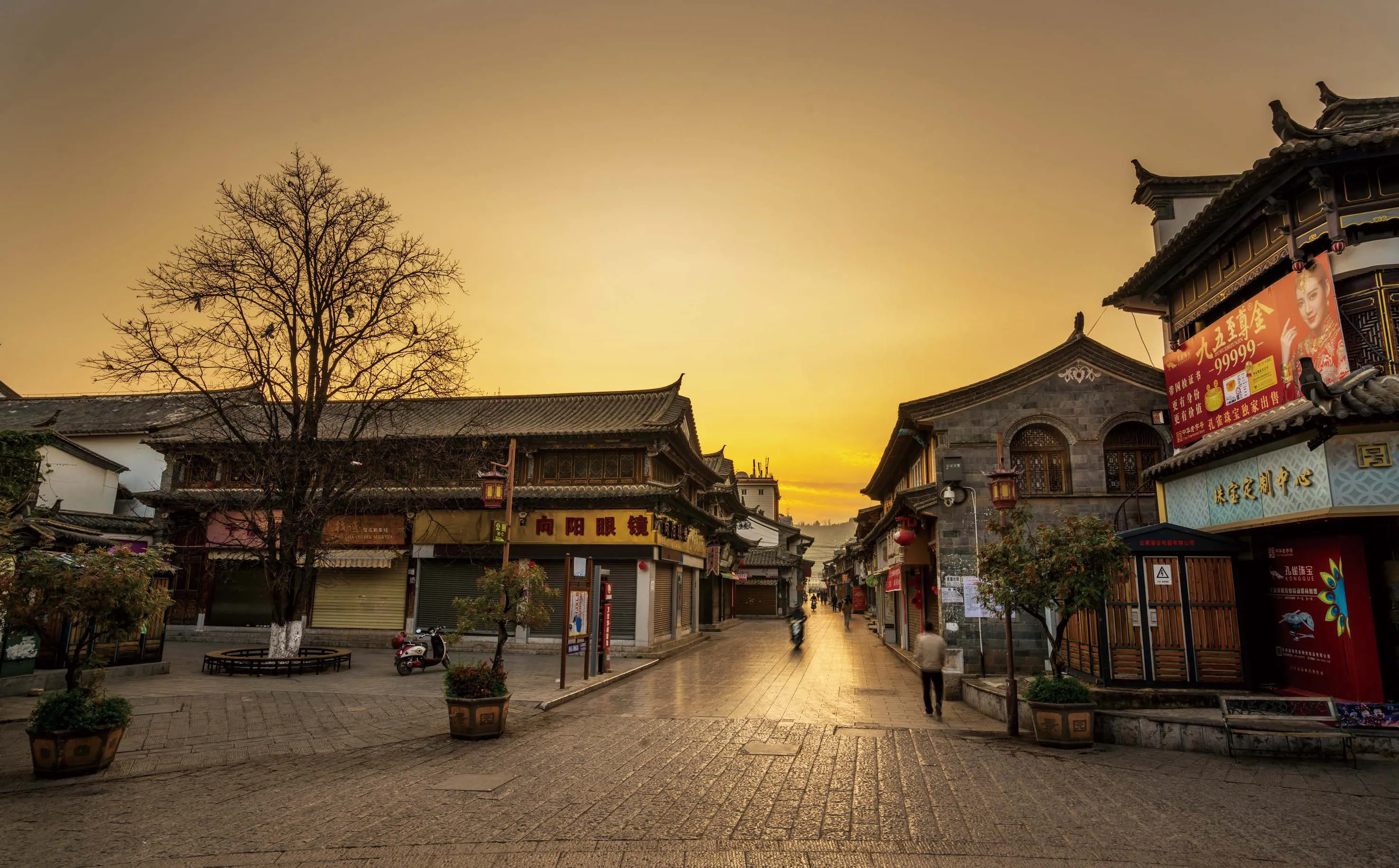
晨曦中的通海古城Ancient Tonghai City amidst Morning Light
In just short period of two days when visiting the ancient city of Tonghai in Yunnan Province,which has the reputation of "Spiritual and Virtue State"with beautiful landscape and profound cultural blends,I came to understand that the ancient city of Tonghai has a long history of over 630 years after paying my tribute in Confucius Temple in Xiu Moutain,letting me shuttle from the well-preserved 24 ancient streets and alleys to the time tunnel of the Ming and Qing Dynasties,tasting the historical vicissitudes of more than 200 "one-print" Ming and Qing dynasties from the design of unique residential buildings,finding the traces of the old caravan walking from the ancient tea-horse road that carries the dream,understanding the hopes for a better life in the future from the industrious neighbors and accepting the baptism of ancient Chinese culture from the traditional crown ceremony.This is the ancient city of Tonghai,a place of ancientness,distance,mystery,and full of vitality.
Origin of Spiritual and Virtue State
As a city of culture,the ancient city of Tonghai features a long history with simple folk customs and profound cultural heritage since ancient times,attracting merchants from far.When you stand outside the Confucian Temple in Xiu Mountain,you could clearly feel the four Chinese characters LI YUE MING BANG on the red wall of the Temple,meaning"LI,manage the country,achieve social harmony,live a stable life; YUE,change the traditional customs,eliminate evil thoughts and promote noble sentiments; MING BANG means places rich in talents,as there were 278 people out of two generations claiming the first-degree scholars,imperial scholars and the Hanlin academicians of the Ming and Qing Dynasties,cultivating ZHU Zun (Minister of Rites) based upon the study of temple knowledge in Tonghai,DONG Qi and DONG Jian of GONGSUN Hanlin,renowned calligrapher KAN Zhenzhao and etc."
In the ancient dwellings,I also found a very meaningful multicultural folk phenomenon.Since the ancient city of Tonghai is the residence of Mongolian,Yi,Hani and other ethnic minorities,each of the halls of every household has chosen murals,couplets and poems presenting the main personality,different performance and distinct national characteristics; the diverse styles of resting areas by water,corridors and murals in the courtyard fully demonstrate the Chinese cultural heritage of the ethnic minorities in Tonghai.To date,it is highly commended that the residents of the ancient city still maintain the tradition of chanting poetry and painting,as they "consider the wine as a pair of songs,make a splash of ink and poetry and enjoy the gentle and slow life" from time to time in the Confucian Temple in Xiu Mountain,or in their own yards.
Unique Residential Building

古镇第一家民宿客栈First B&B inn in the ancient city
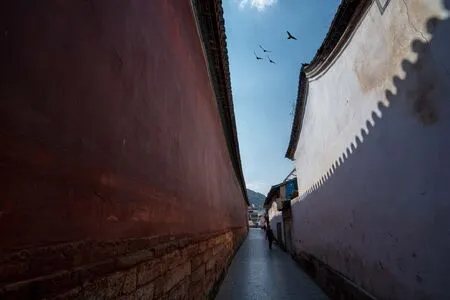
茶马古道Tea-Horse Road
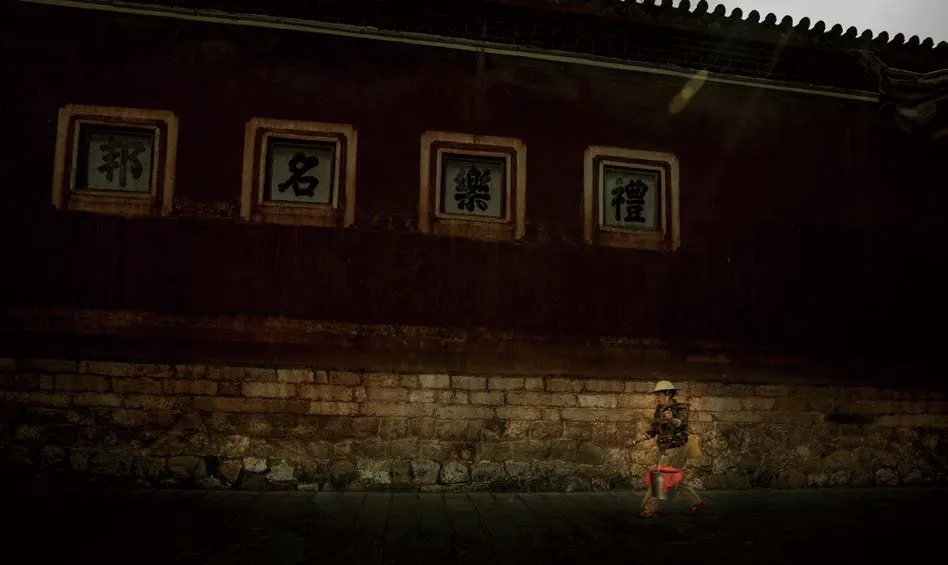
文庙红墙上的“礼乐名邦”"LI YUE MING BANG" on the red wall of the Temple of Literature
Accomplished since the 15thyear of Ming Hongwu,the whole ancient city was built by the mountain (Xiu Mt.) while facing the lake (Qilu Lake),sitting south to the north.The city,which was under regular construction,witnesses the intersection of all directions---Jukui Pavilion.Overlooking from high location,the ancient city looks like a seal,the pavilion the seal handle while the ancient dwellings built around it.Just as the poet QIAN Nanyuan of the Qing Dynasty once chanted,"the lonely city sits by the mountains and waters,and remembered in the rainy places to the southern China".
Looking around,the ancient houses,shops and monasteries on both sides of blue-slate road are preserved in the style of Ming and Qing Dynasties.The diverse-formed residential buildings,mixed-structured and intricate courtyards,and the ancient houses all follow the "one seal" courtyard pattern of Yunnan Province,which,after centuries of historical evolution,still retains its quaint charm,especially the pavilions and waterfront promenades,the courtyard pillars,the bonsai woodcarving murals,and the stone ponds with ancient musical instrument of the well-preserved dwellings are perfectly combined under the hands of skilled craftsmen.It is this houses that stand in the wind and rain,surviving in the smoke,talking amid inheriting the culture,informing people one story after another,and becoming the most proud romance of people's life of the ancient city.
Ancient Streets
Surrounding the Jukui Pavilion,the streets and lanes of the ancient city Tonghai extend from the east,west,south and north,reflecting the traditional Chinese "Nine Palaces" pattern.There are 24 traditional streets and alleys in the city,including 12 north-south streets and 12 east-west streets respectively.The original pattern and street names are still preserved,as they are like the meridian of Tonghai ancient city,connecting all people while performing a beautiful legend one after another.
When you go down the street and walk through the lanes,you can see that the streets are well organized,the houses are also under functional preservation,and the people are civilized and harmonious.Residents are all gentle and calm with courtesy and enthusiasm to greet and invite visitors for tea and chat with passion when people walk on the bluestone streets in this comfortable and calm day upon encountering anyone,entering any households or exploring any stories.It seems that every house,slate or ancient well in this place is quietly telling the long years of traditional culture of Tonghai.
Silent Tea-horse Road
Tonghai was once an important station on the ancient teahorse road.I heard that Yongji Bridge was the only way to the ancient tea-horse road.Following the mottled streets leading to the Bridge,I found that there was no such thing as a bustling town.It's so quiet and serene,just like: "Tranquility with Silence."Although the river under the famous Yongji Bridge on the ancient tea-horse road has dried up,the horse shops gathered by the merchants along the Yongji Bridge has been used for other purposes,however,the bridge still holds this ancient golden road shouldering dreams of so many horse-riders.Walking on the stones that have been smoothed and polished by the horseshoes in the past,you will also find the shaded horseshoe prints of the caravans passing through in the past,still recording the traces of ancient times.
According to the records of Tonghai County,the ruling power of the Tang Dynasty passed through the "Tonghai" to "Tuodong City" (now Kunming) and "Dali" from "Annan (Hanoi of Vietnam)"in the early Tang Dynasty so as to tightly control Yunnan and consolidate the unification of the area.Tonghai is located in the central area of Yunnan,125 kilometers from Kunming and more than 40 kilometers away from Yuxi.The Pan-Asia Railway,the great Southeast Asian international passage,passes through the territory of Tonghai.It is not only a golden ancient road with rich products and culture,but also the transportation hub connecting Jiaozhi (present-day Vietnam) to the south,Yunnan and Sichuan to the north,and western Yunnan,Myanmar and India to the west.However,after the opening of the Yunnan-Vietnam Railway in 1910,the ancient city of Tonghai gradually lost its transportation advantage,leading the ancient city into silence...
Pure and Honest Neighorhood
Walking in the streets of blue slate,it seems to touch the times of Ming and Qing Dynasties,the weather-stricken elderly lady of Dai nationality,the daddy of Meng nationality enjoying his leisure,women of Hani nationality and the youngster of Yi nationality involved in painting constitute a life picture of Tonghai with filial piety,harmony and peace with nature.
In a B&B inn,I chatted with an old lady and her daughter-inlaw.Her home was the first batch of rebuilt B&B in the town decorated with many antiques,the double standard room was comfortable and clean with tranquility.
The 90-year-old lady had clear ears and eyes,talking to me pointing at the inn sign of the gate that this is the "Excellent Inn"brand issued by the government.Admiring the satisfaction,pride and happiness on her face,I sincerely felt gratified for the lady's sense of security,worthiness and the feeling of happiness,which is the tradition of China - loyalty and filial virtue,I wish the old lady a fulfilling longevity.
Traditional Crown Ceremony
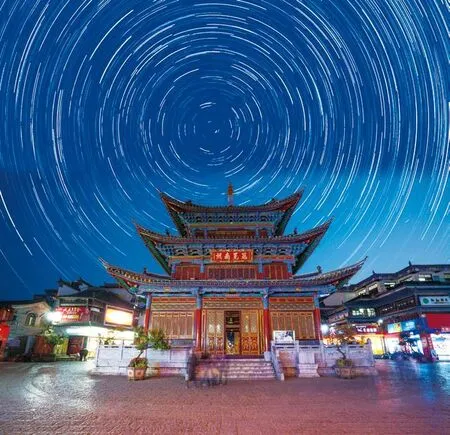
星夜中的聚奎阁Jukui Pavilion at Night
The adult ceremony is also called the crown ceremony.Confucianism positions this ceremony as the beginning of etiquette with a very high cultural status.Teenagers between the ages of 15 and 18 participate in adult ceremonies,which inspire the young people's patriotic,progressive,rational,and industrial spirits.It is committed to opening a new chapter in life with solemn rituals,helping them to realize the shouldering of responsibility,fulfilling obligations and declaration of adulthood.In this particularly warm adult day,parents give their children a crown and personally comb their hair.The boy's parents crown their son,and the girl's parents comb the daughter's hair,meaning the child is no longer spoiled while bidding farewell to childishness and embracing maturity,taking up social responsibility,and also marking the starting of their adult life.
The crown ceremony in Tonghai ancient city,held irregularly every year,allows parents and their children to simultaneously absorb the traditional culture of the Chinese nation,build a spiritual bridge let children perform filial piety,be grateful,and make the parents acknowledge more about their children with much communication and harmony.Although I did not participate in the ceremony directly,I still felt its traditional charm at the gallery of Tonghai Xiushan Primary School.
Although it is just a glimpse of the traditional culture of the ancient city of Tonghai,you may feel that the millennium may be inadvertently flowing between Xiu Mountain and the Confucius Temple after thorough taste,not only in the hustle and bustle of Qilu Lake,but also melting into the hearts of each of us...
Standing in front of the statue of the Confucius and his disciples in the Confucius Temple,I felt that there was such silence between heaven and earth.A leisurely and slow life scene never seen before came into my mind.A white cloud hanging slowly over the temple,the devout pilgrims were scenting slowly,bowing and praying,and I was slowly savoring the ever dialogue with the ancient city.In any case,Tonghai ancient city used to be an important station on the ancient tea-horse road.Its well-preserved complete spatial pattern,streets and architectural style not only revealed the prosperity of the past,also indicated its importance as inheriting and promoting the rituals of China.
